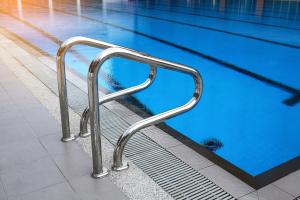A pool circulation system works by drawing water from the pool, filtering it, and returning clean, treated water back into the pool”
METAIRIE, LA, UNITED STATES, November 20, 2024 /EINPresswire.com/ -- Proper pool circulation is fundamental to maintaining clean, safe, and efficient pool water. Circulation systems are responsible for moving water throughout the pool, distributing chemicals evenly, and filtering out debris. Without effective circulation, pools are more prone to common issues such as algae growth, cloudy water, and chemical imbalances.— William Gunzburg
William Gunzburg, owner of Kingfish Pools Inc. in Metairie, Louisiana, highlights the critical role of circulation systems in preventing these problems and extending the life of pool components.
The Basics of Pool Circulation Systems
"A pool circulation system works by drawing water from the pool, filtering it, and returning clean, treated water back into the pool," notes Gunzburg. This continuous cycle keeps the water in motion, which is essential for preventing stagnation and maintaining water clarity.
The main components of a circulation system include:
Pump: The heart of the system, responsible for moving water through the circulation loop.
Filter: Removes dirt, debris, and impurities from the water.
Skimmer and Drains: Collect debris from the surface and bottom of the pool.
Return Jets: Reintroduce filtered water back into the pool.
Each component must function optimally to ensure that water is circulated evenly and effectively throughout the pool.
Benefits of Proper Pool Circulation
Proper circulation is not only necessary for maintaining water quality but also for improving overall pool efficiency. The benefits include:
Even Chemical Distribution: Circulation ensures that chemicals, such as chlorine or pH balancers, are evenly dispersed throughout the pool. This prevents localized areas of high or low chemical concentration, which can cause skin irritation or ineffective sanitation.
Prevention of Algae Growth: Stagnant water is a breeding ground for algae. By keeping water in constant motion, circulation systems reduce the likelihood of algae formation.
Cleaner Water: Effective circulation moves debris toward the skimmer and drains, allowing the filtration system to remove impurities and maintain water clarity.
Efficient Heating: For pools with heaters, circulation ensures that heat is distributed evenly, preventing cold spots and reducing energy waste.
Extended Equipment Lifespan: Proper circulation reduces the workload on the pump, filter, and heater, minimizing wear and extending the lifespan of these components.
Common Issues with Pool Circulation Systems
Circulation systems require regular maintenance to remain effective. When issues arise, they can quickly impact water quality and system efficiency. Common problems include:
Clogged Filters or Skimmers: Debris accumulation can restrict water flow, reducing circulation and filtration effectiveness.
Pump Malfunctions: A malfunctioning pump may fail to move water through the system, leading to stagnation and poor filtration.
Improper Jet Placement: Return jets that are not angled correctly can create dead zones where water remains stagnant.
Air Leaks: Air entering the system can disrupt water flow and cause the pump to lose prime.
Addressing these issues promptly is essential to maintaining a healthy pool.
Tips for Improving Pool Circulation
Several steps can enhance the performance of a pool circulation system:
Run the Pump Regularly: Operating the pump for 8 to 12 hours a day, depending on pool size and usage, ensures that water is continuously circulated and filtered.
Clean the Filter: Regularly cleaning or backwashing the filter removes debris and prevents clogs that could reduce water flow.
Adjust Return Jets: Angling return jets downward and in a circular pattern helps distribute water evenly and eliminates dead zones.
Skim the Surface: Using a skimmer net to remove surface debris before it sinks reduces the workload on the system.
Maintain Proper Water Levels: Ensuring that the water level is high enough to cover the skimmer opening allows the system to function correctly.
Seasonal Considerations for Pool Circulation
Changes in weather and pool usage affect circulation needs. During warmer months, higher water temperatures and increased use can strain the system, requiring longer pump operation times. Conversely, in cooler months, reduced usage allows for shorter pump cycles.
For pools in areas prone to heavy rain, such as Louisiana, monitoring water levels and clearing debris after storms is crucial to maintaining proper circulation.
Advances in Circulation System Technology
Recent advancements in pool circulation systems, such as variable-speed pumps, have improved energy efficiency and control. These pumps allow for adjustable flow rates, enabling precise customization of circulation based on the pool’s size, usage, and features.
Additionally, automated control systems provide real-time monitoring and adjustments, ensuring optimal performance without constant manual intervention.
Conclusion
Effective pool circulation systems are essential for maintaining clean, safe, and efficient pools. By keeping water in motion, these systems prevent problems such as algae growth, uneven chemical distribution, and equipment strain. Regular maintenance and attention to system performance ensure that pools remain a healthy and enjoyable environment for swimmers.
For more information on maintaining pool circulation systems, contact Kingfish Pools Inc. in Metairie, Louisiana, led by William Gunzburg.
Morgan Thomas
Rhino Digital, LLC
+1 504-875-5036
email us here
Visit us on social media:
Facebook
Legal Disclaimer:
EIN Presswire provides this news content "as is" without warranty of any kind. We do not accept any responsibility or liability for the accuracy, content, images, videos, licenses, completeness, legality, or reliability of the information contained in this article. If you have any complaints or copyright issues related to this article, kindly contact the author above.



